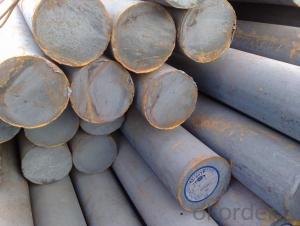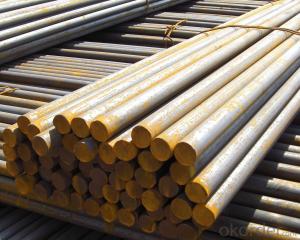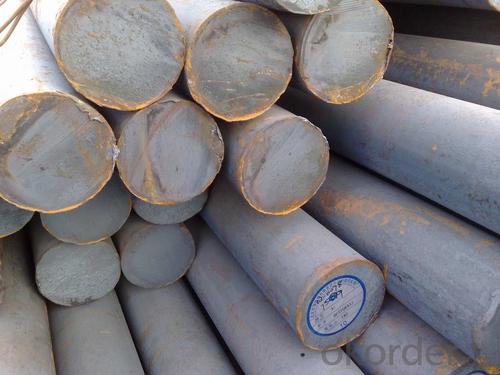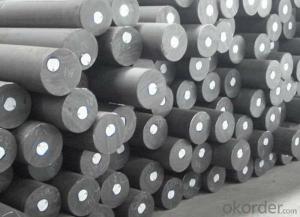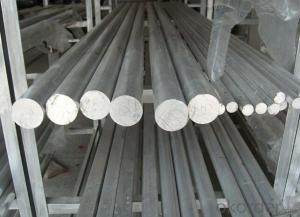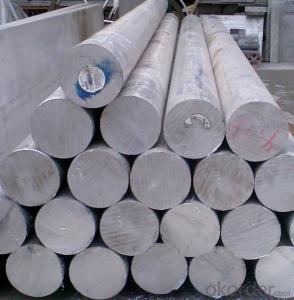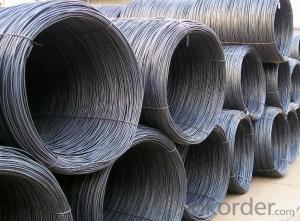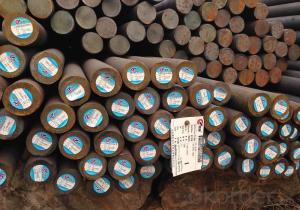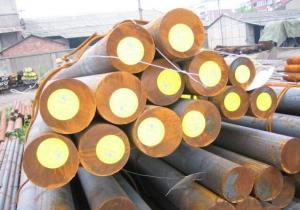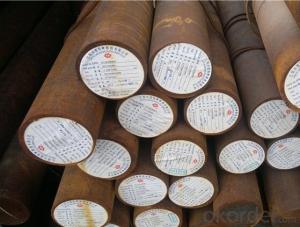Special Steel AISI 5140 Mild Carbon Steel
- Loading Port:
- China main port
- Payment Terms:
- TT or LC
- Min Order Qty:
- 25 m.t.
- Supply Capability:
- 10000 m.t./month
OKorder Service Pledge
OKorder Financial Service
You Might Also Like
Specification
The details of our Steel
1. Produce Standard: as the GB, AISI, ASTM, SAE, EN, BS, DIN, JIS Industry Standard
2. Produce processes: Smelt Iron -EAF smelt Billet - ESR smelt Billet -Hot rolled or forged get the steel round bar and plate
3. Heat treatment:
Normalized / Annealed / Quenched+Tempered
4. Quality assurance:
All order we can received Third party inspection, You can let SGS, BV,.. and others test company test and inspect our products before Goods shipping.
Product information
Chemical Composition(GB)%
C | Si | Mn | Cr | Ni |
0.37-0.44 | 0.17-0.37 | 0.50-0.80 | 0.80-1.10 | ≤0.30 |
Heat Treatment
Item | Temperature ℃ | Hardness |
Normalizing | 850-870 | 179-229HB |
Characterstics: Which has the best comprehensive mechanical properties
Applications
1.Can be used for drawing die and plastic mould | |||
2.Can be used for middle and small punch |
Main product
Plastic Mould Steel
DIN 1.2311,1.2738,1.2083,1.2316 etc.
AISI P20,P20+Ni,420 etc.
JIS SUS420J2
Hot Work Steel
DIN 1.2344,1.2343,1.2367,1.2365,1.2581,1.2713 etc.
AISI H13,H11,H10,H21, etc.
JIS SKD61,SKD6,SKD5,SKT4 etc.
Cold Work Steel
DIN 1.2739, 1.2601, 1.2080, 1.2436, 1.2631, 1.263, 1.2510, 1.2327 etc.
AISI D2, D5, D3, D6, A8, A2, O1 etc.
JIS SKD10, SKD11, SKD1, SKS3 etc.
High Speed Steel
DIN 1.3343, 1.3243, 1.3247, 1.3355 etc.
AISI M2, M35, M42, T1 etc.
JIS SKH51, SKH35, SKH59, SKH2 etc.
Alloy Structural Steel
DIN 1.7035,1.6511,1.7220,1.7225 etc.
AISI 5140, 4340, 4135, 4140 etc.
JIS SCr440,SNCM439,SCM435,SCM440 etc.
Stainless & Carbon Steel or Others
DIN 1.4125,1.1191 etc
AISI 440C,1045, 1020 etc.
JIS SUS440C,S45C etc
Product show

Workshop show

- Q: Can special steel be used for food processing equipment?
- Yes, special steel can be used for food processing equipment. Special steel, often referred to as stainless steel, is commonly used in the food industry due to its corrosion resistance, durability, and hygienic properties. It is non-reactive and does not leach any harmful substances into the food, making it a safe and reliable choice for various food processing applications.
- Q: How does special steel contribute to the energy sector?
- The energy sector heavily relies on special steel, which plays a vital role in improving efficiency, reliability, and safety. Firstly, special steel is essential for constructing pipelines and storage tanks in the oil and gas industry. These components must withstand high pressures, extreme temperatures, and corrosive surroundings, and special steel provides the necessary strength and resistance to ensure their integrity and prevent any leakage. Additionally, special steel is utilized in power generation plants to manufacture turbine blades and other crucial parts. These plants require materials that can endure the high temperatures and pressures generated by fossil fuel combustion or nuclear energy use. Special steel's heat-resistant properties make it the perfect choice for these applications, enhancing the overall efficiency and longevity of power plants. Furthermore, special steel is vital for producing wind turbines, which are rapidly becoming a significant source of renewable energy. The blades, tower structures, and gearboxes of wind turbines undergo significant stress and strain, and special steel provides the strength and durability needed to withstand these conditions. By incorporating special steel, wind turbines can operate reliably and efficiently, contributing to the growth of clean energy. Moreover, special steel is indispensable for infrastructure in the energy sector, such as transmission towers and substations. These structures must support heavy loads and endure extreme weather conditions while maintaining electrical conductivity. Special steel's high strength and corrosion resistance make it an ideal material for these applications, ensuring the reliable transmission and distribution of electricity. In summary, special steel is a crucial element in the energy sector, providing the necessary strength, durability, and resistance to extreme conditions. Its use in pipelines, power generation plants, wind turbines, and infrastructure improves the efficiency, reliability, and safety of the energy sector, facilitating the production and distribution of both conventional and renewable energy sources.
- Q: How does special steel perform in dynamic loading conditions?
- Special steel performs exceptionally well in dynamic loading conditions. It has high strength, toughness, and fatigue resistance, making it capable of withstanding repeated loading and impacts without failure. Its ability to absorb and distribute stress evenly helps prevent cracks and fractures, ensuring the structural integrity of components even under demanding, dynamic loading conditions.
- Q: What are the different certifications available for special steel?
- Depending on the specific industry and application, there are multiple certifications available for special steel. Some of the well-known certifications are as follows: 1. ISO 9001: This certification ensures that the special steel manufacturer has implemented and maintained a quality management system that adheres to international standards. It signifies the company's dedication to consistently delivering products that meet customer requirements. 2. ISO 14001: This certification focuses on environmental management and guarantees that the special steel manufacturer has adopted eco-friendly practices in their operations. It showcases the company's commitment to reducing their impact on the environment. 3. Certifications by ASME (American Society of Mechanical Engineers): ASME provides several certifications for special steel used in pressure vessels, boilers, and other applications. These certifications ensure that the special steel meets industry-specific quality and safety standards. 4. PED (Pressure Equipment Directive): This certification is mandatory for special steel used in pressure equipment within the European Union. It guarantees that the steel meets specific safety and quality requirements. 5. Certifications by NACE (National Association of Corrosion Engineers): NACE offers certifications for special steel used in corrosive environments. These certifications ensure that the steel possesses the necessary resistance against corrosion and can endure harsh conditions. 6. Certifications by API (American Petroleum Institute): API offers certifications for special steel used in the oil and gas industry. These certifications ensure that the steel meets various quality and performance standards required for different applications in the industry. 7. Certifications by ASTM (American Society for Testing and Materials): ASTM provides various certifications for special steel based on specific standards and specifications. These certifications guarantee that the steel satisfies the required mechanical properties, chemical composition, and other criteria. Manufacturers, suppliers, and end-users should take these certifications into consideration when selecting special steel for their specific applications. These certifications provide confidence and assurance regarding the quality, safety, and performance of the special steel products.
- Q: How does special steel contribute to the aerospace defense industry?
- Special steel plays a vital role in the aerospace defense industry as it offers the essential strength, durability, and resistance to extreme conditions needed for various applications in aircraft and defense systems. One of the primary contributions of special steel in this industry lies in its capacity to endure high temperatures and pressures. For instance, special steel alloys are utilized to manufacture turbine blades and other components in aircraft engines that are constantly exposed to exceedingly hot gases. These alloys possess excellent heat resistance properties, enabling them to maintain their strength and structural integrity even under such demanding circumstances. Furthermore, special steel exhibits exceptional resistance to corrosion and erosion, rendering it ideal for aerospace applications. Given that aircraft and defense systems often operate in harsh environments, including exposure to saltwater, moisture, and other corrosive elements, special steel alloys like stainless steel are employed to prevent rusting and corrosion. This ensures the longevity and dependability of critical components. Additionally, special steel is employed in the production of armor plates and ballistic protection systems for military vehicles and aircraft. Its high tensile strength and impact resistance make it an indispensable material for these applications, providing enhanced protection for military personnel and assets. Moreover, special steel finds application in the manufacturing of landing gears, wing components, and airframe structures. These components must withstand tremendous forces and stresses during takeoff, landing, and flight, making the strength and durability of special steel vital for the safety and performance of aerospace systems. In conclusion, special steel plays a crucial role in the aerospace defense industry by supplying the necessary strength, durability, and resistance to extreme conditions required for various applications. Its ability to endure high temperatures and pressures, resist corrosion and erosion, as well as its high tensile strength, make it an essential material in the manufacturing of aircraft engines, armor plates, ballistic protection systems, and other critical components.
- Q: How does special steel contribute to sustainability efforts?
- Special steel is a key player in sustainability initiatives for various reasons. To begin with, its durability and long lifespan make it highly sought after. It boasts exceptional resistance to corrosion, wear, and tear, enabling it to endure harsh conditions and heavy use. By prolonging the lifespan of products made with special steel, the need for frequent replacements is minimized. Consequently, this conserves natural resources and diminishes environmental impact by reducing resource consumption and waste generation. Furthermore, special steel is renowned for its recyclability. It can be melted down and reprocessed multiple times without compromising its properties or quality. This quality makes it a valuable material within the circular economy, where resources are reused and recycled to reduce reliance on virgin materials. The recycling process for special steel requires less energy compared to producing steel from raw materials, leading to lower greenhouse gas emissions and energy consumption. Moreover, special steel finds extensive application in energy-efficient endeavors. For instance, it is heavily employed in the manufacturing of wind turbines, which produce renewable energy. By providing a material capable of withstanding the demanding conditions of wind turbines, special steel contributes to the expansion of clean energy sources. This, in turn, reduces dependence on fossil fuels, curbs carbon emissions, and aids in mitigating climate change. Lastly, special steel plays a vital role in the transportation industry. It is utilized in the production of lightweight, fuel-efficient vehicles like electric cars. Through reducing vehicle weight, special steel improves fuel efficiency and diminishes greenhouse gas emissions. Additionally, special steel is instrumental in constructing infrastructure for electric vehicle charging stations, facilitating the transition to cleaner transportation systems. In conclusion, special steel's contributions to sustainability are extensive. Its properties and applications promote durability, recyclability, energy efficiency, and clean energy generation. By conserving resources, reducing waste, and combating climate change, special steel emerges as a crucial material in shaping a more sustainable future.
- Q: How does special steel perform in high-temperature oxidation resistance?
- Special steel is specifically designed to have excellent high-temperature oxidation resistance. This type of steel contains alloying elements such as chromium, aluminum, and silicon, which form a protective oxide layer on the surface when exposed to high temperatures. This oxide layer acts as a barrier, preventing further oxidation and corrosion of the steel. The high-temperature oxidation resistance of special steel is crucial in applications where the material is exposed to extreme heat and oxidation, such as in gas turbines, heat exchangers, and furnaces. The protective oxide layer helps to maintain the integrity and strength of the steel, even under harsh conditions. Furthermore, special steel also exhibits excellent creep resistance at high temperatures. Creep refers to the gradual deformation of a material under a constant load and elevated temperatures. The unique composition of special steel provides it with the ability to resist creep deformation, enhancing its overall performance and reliability in high-temperature environments. In conclusion, special steel performs exceptionally well in high-temperature oxidation resistance due to its alloying elements and the formation of a protective oxide layer. Its ability to resist oxidation and maintain its structural integrity at elevated temperatures makes it a preferred choice for various industrial applications.
- Q: How does special steel contribute to the agricultural machinery industry?
- The agricultural machinery industry heavily relies on special steel to improve the overall efficiency, durability, and productivity of agricultural equipment. A major advantage of special steel in this industry is its exceptional strength and toughness, which allows for the production of robust and reliable machinery. Agricultural equipment, including tractors, combines, and harvesters, often faces intense operational conditions such as heavy loads, extreme temperatures, and exposure to corrosive elements. Special steel provides the necessary strength and resistance to withstand these challenging environments, ensuring optimal performance for extended periods. Furthermore, special steel alloys offer excellent wear resistance, enabling agricultural machinery to endure the abrasive nature of farming operations. This is especially crucial for components like blades, plows, and tillage tools, which are constantly exposed to soil, rocks, and other abrasive materials. By utilizing high-quality special steel, manufacturers can manufacture durable and long-lasting equipment, reducing maintenance requirements and improving the overall reliability of agricultural machinery. In addition, special steel allows for the development and construction of more efficient agricultural machinery. Thanks to its superior strength-to-weight ratio, special steel facilitates the production of lighter yet robust equipment. Consequently, this improves fuel efficiency, reduces energy consumption, and enhances maneuverability. Moreover, special steel's excellent machinability and formability enable manufacturers to create intricate and customized components, meeting specific agricultural needs and increasing machinery efficiency. Moreover, special steel contributes to the agricultural machinery industry by providing resistance to corrosion and rust. Agricultural equipment is often exposed to moisture, fertilizers, and chemicals, which can result in corrosion and degradation over time. Special steel alloys with corrosion-resistant properties, such as stainless steel, can significantly prolong the lifespan of machinery and reduce maintenance costs. In conclusion, special steel is indispensable for the agricultural machinery industry as it enhances the durability, efficiency, and productivity of equipment. Its strength, wear resistance, design flexibility, and corrosion-resistant properties make it the preferred choice for manufacturing high-quality machinery capable of withstanding the demanding conditions of agricultural operations.
- Q: How long does special steel typically last in various applications?
- The lifespan of special steel in various applications can vary significantly depending on factors such as the type of steel, the specific application, and the conditions it is subjected to. However, special steel is generally known for its durability and longevity, and it can last for several decades or even longer in many applications, especially when properly maintained and used within its recommended limits.
- Q: What are the different methods for joining special steel?
- There are several methods available for joining special steel, which is typically used in applications that require high strength, corrosion resistance, or specific mechanical properties. Some of the most common methods for joining special steel include: 1. Welding: This is the most common method used to join special steel. Different types of welding techniques can be employed, such as arc welding (including shielded metal arc welding, gas metal arc welding, and flux-cored arc welding), resistance welding (spot welding, seam welding), and laser welding. Welding requires the use of filler material to bond the steel pieces together, and it can produce strong and durable joints. 2. Brazing: Brazing involves joining special steel using a filler material (typically a brass or bronze alloy) with a lower melting point than the base steel. The filler material is heated until it melts and flows into the joint, creating a strong bond. Brazing is often used for joining dissimilar metals or when the base steel has a high melting point. 3. Soldering: Similar to brazing, soldering also involves using a filler material with a lower melting point to join special steel. However, soldering typically uses a non-ferrous filler material, such as tin-lead or tin-silver alloys. Soldering is commonly used for joining electronic components or delicate parts that cannot withstand high temperatures. 4. Mechanical Fastening: Special steel can also be joined using mechanical fasteners, such as bolts, screws, rivets, or clips. This method is often used when the joint needs to be easily disassembled, or when welding or brazing is not feasible or desirable. 5. Adhesive Bonding: Adhesive bonding involves using a specialized adhesive or glue to join special steel. This method is suitable for joining thin or delicate steel components or when the joint requires high resistance to vibration or shock. Adhesive bonding can provide a strong and durable bond, but it may not be suitable for high-temperature or high-stress applications. It is important to consider the specific requirements of the application, such as strength, corrosion resistance, temperature resistance, and the desired permanence of the joint, when selecting the appropriate method for joining special steel. Each method has its own advantages and limitations, and choosing the right method will ensure a strong and reliable joint.
Send your message to us
Special Steel AISI 5140 Mild Carbon Steel
- Loading Port:
- China main port
- Payment Terms:
- TT or LC
- Min Order Qty:
- 25 m.t.
- Supply Capability:
- 10000 m.t./month
OKorder Service Pledge
OKorder Financial Service
Similar products
Hot products
Hot Searches
Related keywords
